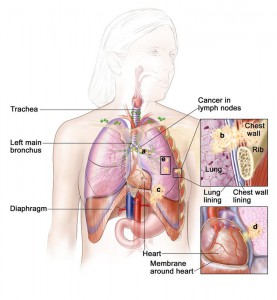Usually symptoms of lung cancer do not appear until the disease is already in an advanced, non-curable stage. Even when symptoms of lung cancer do appear, many people may mistake them for other problems, such as an infection or long-term effects from smoking. This may delay the diagnosis.

We know that the survival rate from lung cancer is better the earlier it is caught. The 60% to 80% 5-year survival rate with stage 1 lung cancer drops to a saddening 10% with stage 4 disease, yet nearly half of people have progressed to this advanced stage at the time of diagnosis. What are the early symptoms of lung cancer that you should be on the lookout for? Keep in mind that understanding the early symptoms of lung cancer is important for non-smokers as well as smokers. At present, 50% of people who develop lung cancer are former smokers, and 15% have never smoked.
A Cough That Doesn’t Go Away
Many people dismiss or adapt to a chronic cough, attributing it to something else. A chronic cough as an early symptom of lung cancer is even easier to miss if you have a condition that predisposes you to coughing, such as asthma, COPD, allergies, or gastroesophageal reflux. Coughing up blood is a common symptom of lung cancer, but can be fairly subtle and you may notice only a small amount of blood tinged phlegm when you cough. If you experience a persistent cough, check with your doctor, and ask for a second opinion if you don’t get a clear answer.
Shortness of Breath with Activity
Another common early symptom of lung cancer is shortness of breath that you only notice with activity. This can be overlooked and blamed on getting older, being out-of-shape, or perhaps due to those few extra pounds you’ve gained.
Pain or Aching in Your Shoulder, Back, Chest, or Arm
Lung cancers may press on nerves, resulting in pain in your shoulder, chest, back, or an arm — even before they cause a cough or difficulty breathing. If you notice pain in one of these areas of the body that doesn’t seem to be related to an injury ,consult your physician. Up to 50% of people with lung cancer have some chest or shoulder pain at the time of diagnosis, especially pain that increases with coughing and breathing.
Repeated Infections Such as Bronchitis and Pneumonia
It’s not uncommon for someone to discover that they have lung cancer after being treated for repeated episodes of bronchitis or pneumonia. If a tumor is located near an airway, it can cause an obstruction that predisposes you to these infections. If you have had a few episodes of bronchitis or pneumonia, talk to your doctor.
With lung cancer now the leading cause of cancer deaths for both men and women , it is important to be aware of any early symptoms. That said, 25% of people have no symptoms at the time of diagnosis, and lung cancer is discovered incidentally when a chest x-ray or CT scan is done for an unrelated reason. CT screening for lung cancer has been shown to decrease lung cancer deaths, but only when done for people between the ages of 55 and 74 who have a history of smoking at least 30 pack-years. Hopefully, a test will be developed in the near future that will allow us to screen for lung cancer as we are now able to screen for some other cancers.
INITIAL TESTING AND DIAGNOSIS
If you have symptoms that suggest lung cancer, your doctor or nurse will perform an examination. If your findings are still concerning, more tests including blood work and x-rays or scans will then be ordered. If the chest X-ray or CT scan shows an abnormal growth that could be a tumor, additional testing is performed to make a diagnosis. Usually, a piece of the growth will need to be removed and examined under a microscope. This procedure is called a biopsy. Importantly, the decision to perform a biopsy does not mean that cancer is present. Biopsies are routinely performed to check for both cancer as well as other diseases which are not cancer.
A biopsy can be done in one of several ways:
- Bronchoscopy is a procedure where a flexible tube with a camera is inserted through your mouth or nose and then into the windpipe (called the trachea). This procedure requires light sedation or anesthesia. This procedure is described in detail separately.
- CT-guided fine needle biopsy is performed by locating the tumor with a CT scan and inserting a thin needle through the skin, into the lung, to remove a tiny sample of tissue.
- Needle aspiration is performed by inserting a needle into lumps or lymph nodes that can be felt under the skin or into fluid collections in the chest.
- Thoracentesis is insertion of a needle and catheter into fluid collections in the chest to remove the fluid and look at it under a microscope.
- Surgery may be needed to remove the tumor if the tumor is small and it is not possible to get a sample of tissue any other way.
ADVANCED TESTING IN LUNG CANCER
In addition to looking at the tumor under a microscope, some lung cancers may also be tested for specific biomarkers. These biomarkers are abnormal proteins and gene mutations that can be found in cancer. If present, these biomarkers may be used to decide between treatment options.
To know more about Lung Cancer Treatment in India please visit this link : https://safemedtrip.com/medical-services/cancer-treatment-in-india/lung-cancer-treatment-in-india.html

 Click to WhatsApp
Click to WhatsApp +91-9899993637
+91-9899993637



